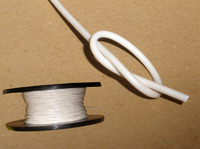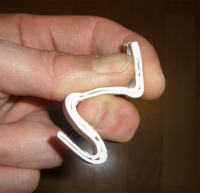 Following up on our earlier post, we’ve located a supply shop that can provide actual flexible PLA. This is not the same material that Vik Olliver is developing; he’s working on a formula to make PLA slightly “bendy”, able to take at least some level of shock, or perhaps a bullet or two. The material we’re talking about is actually fully flexible, as in “bend-it-in-half-many-times” bendable.
Following up on our earlier post, we’ve located a supply shop that can provide actual flexible PLA. This is not the same material that Vik Olliver is developing; he’s working on a formula to make PLA slightly “bendy”, able to take at least some level of shock, or perhaps a bullet or two. The material we’re talking about is actually fully flexible, as in “bend-it-in-half-many-times” bendable. It’s called Soft PLA, and may be purchased today from 2PrintBeta.de, a German-based RepRap supply shop. Soft PLA comes only in light grey color today, and is priced at €43 for 100 metres of 3mm filament. Other shops typically sell filament by weight, not by length. So how does this compare pricewise per Kg?
There it is: Soft PLA is currently about twice the price of normal inflexible PLA. But who knows, this may change if it proves popular.
 Meanwhile, what does it take to print with soft PLA? Evidently you should print on a cold glass surface for best sticking, as well as upping your PLA temperatures a tad. According to BonsaiBrain of iFeelBeta:
Meanwhile, what does it take to print with soft PLA? Evidently you should print on a cold glass surface for best sticking, as well as upping your PLA temperatures a tad. According to BonsaiBrain of iFeelBeta: After testing a few times how fast you can print this soft PLA I found out that there is a upper limitation of about 19 mm/s – independent of the flow rate. Every print above this speed breaks if you squeeze it. A good printing temperature is around 210 °C although the distributor reported a melting temperature of 270 °C.
With this material we can imagine an entirely new range of interesting objects to print, particularly if you combine “hard” parts with this soft material. Think hinges, belts and of course, squishy.
Via iFeelBeta and 2PrintBeta


